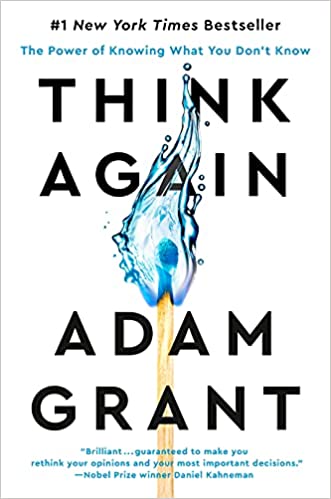
Think Again: The Power of Knowing What You Don’t Know is a 2021 book by Adam Grant that several colleagues have recommended. Grant is an organizational psychologist at The Wharton School (UPenn), where he has been the “top-rated professor for seven straight years.” He previously authored the bestsellers Originals and Give and Take.
The book is broken into three main themes (individual, interpersonal, and collective) that examine the critical art of rethinking. The themes teach you to question your own opinions, then open other people’s minds, and finally help with collective rethinking for excellence at work and life.
Think Again builds a strong case for rethinking, with many rich examples. This summary will focus on the “Actions for Impact” Grant includes at the end of the book. We share our top ideas from each section.
Individual Rethinking
Develop the Habit of Thinking Again
- Think like a scientist: Resist the temptation to preach and prosecute. Treat your current opinion on a matter like a hypothesis in an experiment. Use the scientific method in the improvement cycle to observe and learn, using data to refine your theories.
- Seek out information that goes against your views: In today’s world it is easy to find people who will agree with your point of view. Avoid getting stuck in your beliefs and confirmation bias by actively engaging with ideas that challenge your views. Value learning what others think.
Grant suggests following people who make you think – even if you usually disagree with what they think.
Calibrate Your Confidence
- Understand the Dunning-Kruger effect: This is the finding by two psychologists that it’s when we lack competence that we are likely to be brimming with overconfidence. In other words, the more you know about a subject the more you will understand how much you don’t really understand. Conversly, when you know very little about a topic you believe the topic is easy to master.
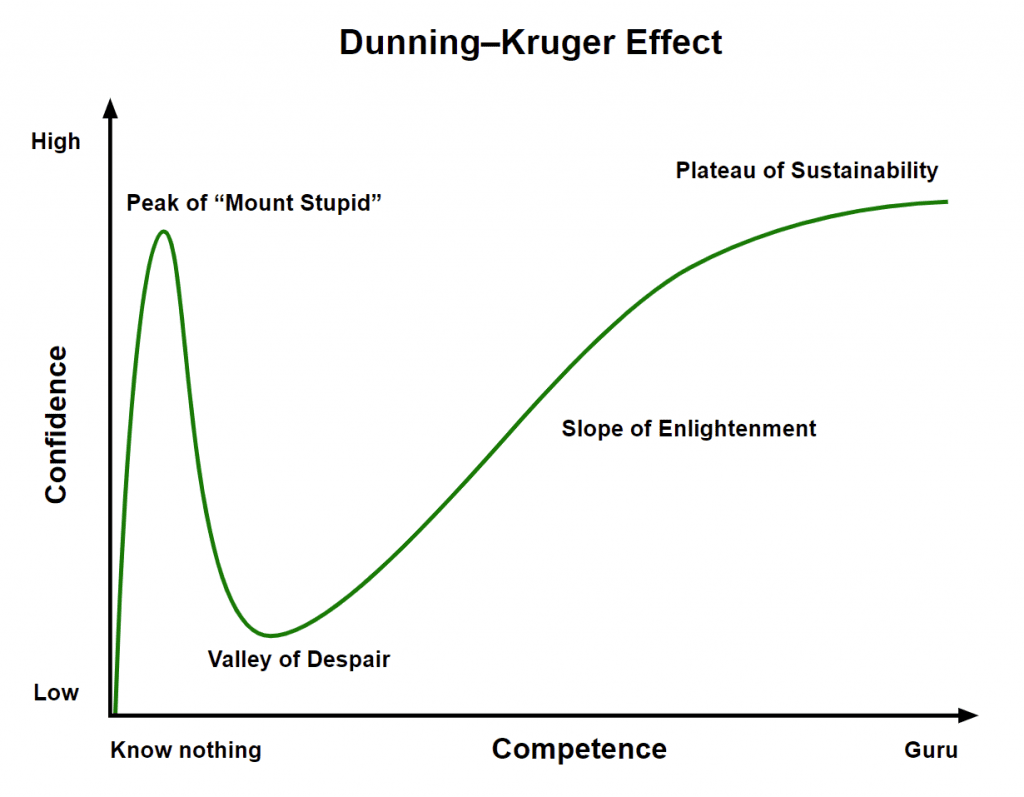
Grant’s example of the “armchair quarterback” stuck with me. Why is it that football fans drinking beer on the weekend feel they are more knowledgeable than the football coach? Maybe those of us who have never played a game of football in our life really don’t know more than the professional coaches!
Invite Others to Question You
- Learn something new from everyone you meet: Everyone knows more than you about something. Challenge yourself to figure out what that is so you can learn from others.
- Build a challenge network; don’t surround yourself with “yes men”: Identify the friends and colleagues who are your most thoughtful critics and invite them to question your thinking. Grant suggests, “to make sure they know you’re open to dissenting views, tell them why you respct their pushback – and where they usually add the most value.”
“Everyone knows more than you about something.”
ADAM GRANT
Interpersonal Rethinking
Ask Better Questions
- Practice the art of persuasive listening: When trying to influence others we can frequently accomplish more by listening than talking. Grant encourages his readers to, “increase your question to statement ratio.” Questioning how they will make their views a reality rather than why they hold the views is also encouraged.
- Ask “What would change your mind?”: This question will often force people into examining the existing evidence that has led them to their conclusion. Don’t try to bully people into agreeing with you; learn what their own reasons are and see if you can convince them on their terms.
Disagreements are dances, not battles

- Acknowledge common ground first: In a debate, begin by admitting points of convergence. This shows the other party that you see their point of view, and motivates the other party to consider your point of view.
- Reinforce the other party’s freedom of choice: Some people close down an argument as a rejection of how you are making them feel. They don’t want to feel manipulated, so they “shut down” and stop considering your view. Remind the people you disagree with that its up to them to chose what they believe.
- Focus on the process: Lean East projects often have the ground rule, “blame the process, not the people.” If a topic begins to get personal or emotional try redirecting the discussion to the process. Have a conversation about the conversation, and look for common ground where you both may agree.
“Blame the process, not the people.”
Collective Rethinking
Have Nuanced conversations
- Add context to contentious topics: There are more than two sides – and two choices – in every argument. Grant suggests, “instead of treating polarizing issues like two sides of a coin, look at them through the many lenses of a prism. Seeing the shades of gray can make us more open.”
- Acknowledge caveats and contingencies: Pointing out the other side of an argument doesn’t sacrifice credibility. It may instead engage the other party and keep them curious.
Teach Kids to Think Again

- Encourage kids to do multiple drafts and seek feedback: Help kids to see the benefits of reworking a project. Save the initial version of their work so they can see the improvements they made after getting feedback from others.
- Stop asking, “What do you want to be when you grow up?”: Kids growing up today are unlikely to have a single career like their grandparents often did. Instead of narrowing their options seek to broaden their thinking. They don’t have to become something when they grow up – they can be many things!
Create Learning Organizations
- Abandon best practices: Discourage the idea of copying what others do, or thinking that the ideal routines are already in place. Focus on the principles of Lean continuous improvement – identify excellence and keep experimenting on ways to get closer to perfection.
- Establish psychological safety: To create learning organizations it is critical that employees feel confident that they can ask questions without being reprimanded. Grant notes, “psychological safety often start with leaders role-modeling humility.”
Stay Open to Rethinking
- Schedule a life checkup: All of us change in the course of our lives. Interests from a few years ago may bore you today. It is beneficial to review your values, goals, and progress in the same way you visit a doctor for an annual physical to assess your health.
I have long scheduled semi-annual goal and life assessment reviews. I suggest January 1 and July 1 for rethinking and resetting your values and goals. You can also do this every year on your birthday.
- Make time to think again: We all can get consumed with a calendar full of things we are doing. Begin adding time to your calendar for rethinking and relearning. Use this time to reach out to your challenge network (you have one, right?) to learn what ideas and opinions they think you should be reconsidering.
Next Steps
Rule 6 of the Personal Kaizen “10 Rules for Life” is to Learn and Grow Throughout Your Life. We believe strongly in the growth mindset principle that you can always become better or smarter through hard work.
We feel the ideas for action shared by Adam Grant in Think Again will help us all become better at how we think about and respond to the world.
Please share your thoughts about these ideas below.

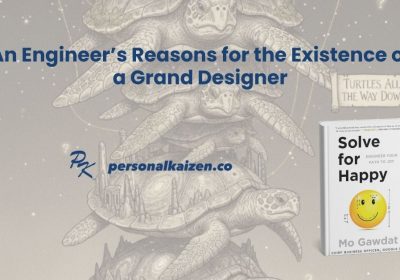
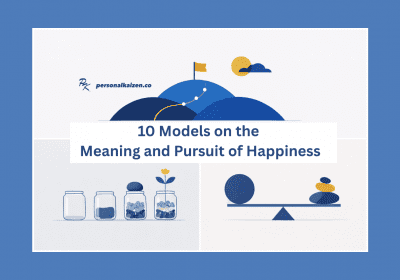
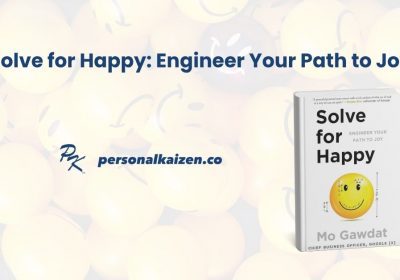
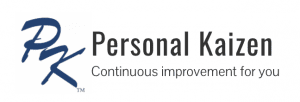
I find Personal Kaizen to be very helpful and practical. As a senior manager, I am putting the tips into practice in my work and family relationships. Thank you Lean East for this innovatiive and helpful program. Bill
Thanks, Bill!
I just completed this book on audio. Adam Grant is a fantastic narrator. This is a great recap and reminder of the valuable information in this book! Thanks!
Thanks, Katie!